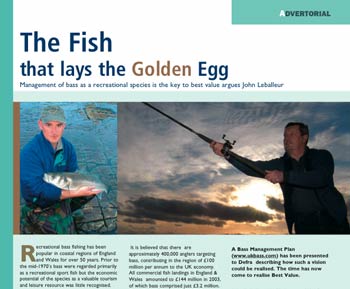[Comment – After their submission of evidence to the Environment, Food and Rural Affairs Committee on the future of UK Fishing policy, BASS were invited by the ‘Parliamentary Monitor’ magazine to write the following article, for their March 2005 issue concerning the UK Fishing Industry.
The ‘Parliamentary Monitor’ magazine covers parliamentary and government issues in depth it also provides a perspective on international, european and regional issues. The Parliamentary Monitor has an exclusive readership amongst the highest level of decision makers in the private and public sector at national and regional level. With a range of respected contributors The Parliamentary Monitor is already established as a ‘must read’ for those involved or interested in the political world and its impact.]
 The Fish that lays the Golden Egg
The Fish that lays the Golden Egg
Management of bass as a recreational species is the key to best value argues John Leballeur, Chairman of the Bass Anglers’ Sportfishing Society (BASS).
Recreational bass fishing has been popular in coastal regions of England and Wales for over 50 years. Prior to the mid-1970s bass were regarded primarily as a recreational sport fish but the economic potential of the species as a valuable tourism and leisure resource was little recognised. From the 1980s commercial gill-netting for bass expanded significantly and spawning fish were targeted by pair trawlers.
Although the bass stock is deemed to be within safe biological limits due to the abundance of small fish taken by the commercial fishery, older , larger fish, which are highly prized by sea anglers are now very scarce.
In the United States the superior economic value of striped bass managed as a recreational species has been well documented and many States allocate the bass for sportfishing. Recovery of this species from commercial over-fishing resulted in recreational expenditure soaring from $85 to $560 million between 1981 & 1996.
The Defra funded Drew report estimated that there were 1.45 million sea anglers in England & Wales whose direct expenditure topped £500 million per annum to the UK economy, supporting 19,000 livelihoods.
It is believed that there are approximately 400,000 anglers targeting bass, contributing in the region of £100 million per annum to the UK economy. All commercial fish landings in England & Wales amounted to £144 million in 2003, of which bass comprised just £3.2 million.
Economic studies on fishery values from many other countries now clearly show that fish such as bass, targeted by recreational sea anglers, are worth far more to coastal communities as a sportfish than the commercial value. Bass anglers frequently return fish alive to encourage stock conservation which also further perpetuates their value.
The current lack of ‘Best Value’ goals for fisheries managers has resulted in the opportunity for a world class sport fishery being squandered. Should the government ‘Objective’ for fisheries management be altered to that of providing the best return to the UK, in line with recommendations from the Cabinet Office Strategy Unit, the Bass Anglers’ Sportfishing Society believe the potential exists to develop the recreational bass fishery in the UK into a £200+ million per annum industry.
A ‘BASS Management Plan’ has been presented to Defra, by BASS, describing how such a vision could be realised. The time has now come to realise ‘Best Value’.